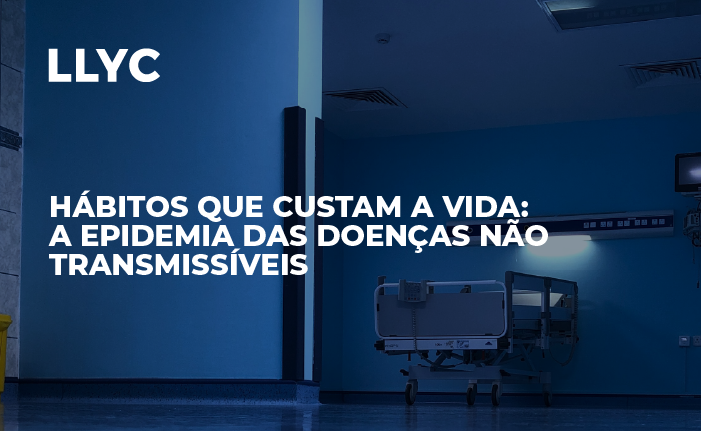
Noncommunicable Diseases impact the quality of life of millions of people, generate high costs for Health Systems and have been called the great epidemic of our time by the Pan American Health Organization (PAHO).
To address this situation, the communication consultancy LLYC presents the Report Habits that can cost you your life: The Epidemic of Noncommunicable Diseases, which has counted with the participation of 38 Latin American experts from medical organizations, government, academia, patient groups, civil society organizations, companies and associations in Colombia, Mexico, Argentina, Panama, Dominican Republic, Ecuador and Brazil, with the aim of answering the question: How can we stop this epidemic?
The document analyzes documents and official sources of information from the ministries of health, public health societies, and health statistics centers in 7 Latin American countries, with a focus on the prevalence, consequences and modifiable factors of noncommunicable diseases, and compares the findings with the experience of the 38 participating experts, most of whom define the current health promotion and prevention strategies as insufficient.
The need for investment grows to be able to achieve the PAHO recommendations
The study reveals differences between the needs of patients suffering from these diseases and the resources allocated to respond to them. Although there is a universal commitment to reduce premature mortality from NCDs by 30% by 2023 (WHO), closing the investment gap for people living with NCDs is one of the main challenges for the Americas region, where most countries still do not have a budget allocated to this strategy and do not comply with PAHO’s recommendation to have a public investment in health equivalent to 6% of GDP by 2027.
The view of the experts: Toward a preventive health system
90% of the 38 experts who participated in the report agreed on the need to join efforts, link civil society and the private sector to obtain better results in the fight against these diseases and improve people’s quality of life. To this end, they highlight the urgent need to change the approach from a curative model to a preventive model, since we are dealing with policies that focus on treating diseases and not on prevention, and 9 out of 10 respondents agree that patients do not have a culture of adherence to treatment.
When asked about the main challenges to face NCDs and especially their recommendations to reduce the burden of these diseases, 97% of those surveyed responded as their first recommendation or requirement for governments to focus on prevention to improve the timely diagnosis rate; 90% mentioned the importance of creating patient education programs about healthy lifestyles and access to medications; 80% indicated the need to strengthen primary care; and 5% cite the importance of fighting air and water pollution and being attentive to carcinogenic precursors in food.
More effective two-way communication
The report identifies the need for campaigns that consider two-way communication and creativity to generate a connection that manages to create influence to change habits and achieve a healthier society with the use and analysis of data, new technologies and new communication channels.
It requires a leadership that searches for a new relationship scheme to achieve the participation of different sectors, identify areas of conversation and opportunities to create a new narrative that promotes change among patients and their influencers to inspire a coordinated effort that achieves the expected results for 2030, a goal set by the WHO.
And it concludes that success will be reflected in the change of habits and in the increase of the 10 indicators for monitoring progress in relation to NCDs, established by global and regional multilateral organizations (NCD Alliance, WHO, PAHO).


